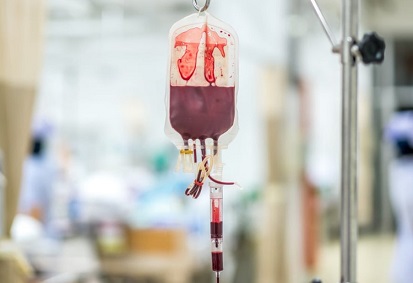BREAKING! Japanese Researchers Warn About Risks Associated With Blood Transfusions From COVID-19 mRNA Vaccinated Individuals
Nikhil Prasad Fact checked by:Thailand Medical News Team Mar 16, 2024 1 year, 11 months, 5 days, 12 hours, 2 minutes ago
COVID-19 News: The COVID-19 pandemic, declared by the World Health Organization (WHO) in 2020, has spurred unprecedented efforts to develop and deploy genetic vaccination programs worldwide. Genetic vaccines, particularly those utilizing mRNA technology, have emerged as powerful tools in combating SARS-CoV-2 infection. However, concerns have been raised regarding potential risks associated with blood transfusions involving individuals who have received COVID-19 mRNA vaccines. This
COVID-19 News report delves into the intricacies of genetic vaccines, the risks they may pose in transfusion scenarios, and proposes detailed measures to address these concerns.
 Risks Associated With Blood Transfusions From COVID-19 mRNA Vaccinated Individuals
Understanding Genetic Vaccines and Mechanisms of Action
Risks Associated With Blood Transfusions From COVID-19 mRNA Vaccinated Individuals
Understanding Genetic Vaccines and Mechanisms of Action
Genetic vaccines, including mRNA vaccines developed by leading pharmaceutical companies like Pfizer-BioNTech and Moderna, function by introducing genetic material encoding viral antigens, such as the spike protein of SARS-CoV-2, into host cells. This triggers an immune response that primes the body to recognize and combat the virus upon exposure. While these vaccines have demonstrated efficacy in preventing COVID-19 infection, emerging evidence suggests potential risks associated with their use, particularly regarding post-vaccination thrombotic events, cardiovascular complications, and systemic organ-related disorders.
Risks Associated with Blood Transfusions from Genetic Vaccine Recipients
Recent research conducted by institutions such as Asahikawa Medical University, Tokyo Medical University Hospital, MCL Corporation, Kyoto, Okamura Memorial Hospital, Tokyo University of Science, and Kokoro Medical Corporation in Japan has highlighted the risks associated with blood transfusions involving individuals who have received COVID-19 mRNA vaccines. These risks encompass a spectrum of potential complications, including but not limited to:
-Blood Abnormalities: Studies have reported cases of thrombocytopenia, thrombotic disorders, and abnormal red blood cell morphology in genetic vaccine recipients. Microscopic examination of blood samples from mRNA-vaccinated individuals has revealed anomalous findings, raising concerns about the potential toxicity of spike proteins and vaccine components.
-Immune Dysfunction: Genetic vaccines may lead to immune-related complications, including immune imprinting, antibody-dependent enhancement, and alterations in immunoglobulin class switching. These phenomena can impact the immune system's response to subsequent infections, potentially increasing susceptibility to certain pathogens or autoimmune reactions.
-Neurological Complications: There is growing evidence suggesting that the spike protein produced by genetic vaccines has neurotoxic properties and can cross the blood-brain barrier. This raises concerns about neurological complications in vaccine recipients and underscores the need for thoro
ugh monitoring and assessment.
Proposed Measures and Recommendations
In response to these identified risks, the following measures and recommendations are proposed to mitigate potential harm and ensure the safety of blood transfusions involving genetic vaccine recipients:
-Comprehensive Testing Protocols: Develop and implement rigorous testing protocols to assess the safety of blood products derived from genetic vaccine recipients. This includes screening for spike proteins, vaccine components, immune markers, and potential neurotoxicity indicators to identify any adverse effects.
-Regulatory Guidelines: Establish clear regulatory guidelines governing the collection, processing, storage, and transfusion of blood products from genetic vaccine recipients. These guidelines should outline strict protocols for donor screening, product labeling, and adverse event reporting to enhance safety and accountability.
-Long-Term Monitoring and Surveillance: Conduct long-term monitoring and surveillance studies to track the health outcomes and potential complications associated with blood transfusions from genetic vaccine recipients. This includes monitoring for thrombotic events, immune-related disorders, neurological manifestations, and other adverse reactions.
-Public Awareness and Education: Increase public awareness and education about the risks and benefits of genetic vaccines, blood transfusions, and immune-related disorders. This includes providing accurate information to healthcare professionals, patients, and the general public to facilitate informed decision-making and healthcare practices.
-Legislations - Laws and regulations need to be amended such that all sources of blood for transfusions are labelled as to whether they were from vaccinated or unvaccinated sources and also the recipients should have the rights to reject whatever types they do not feel comfortable with.
Conclusion
The risks associated with blood transfusions from COVID-19 mRNA vaccinated individuals are a significant concern that necessitates proactive measures and comprehensive strategies. By implementing robust testing protocols, regulatory guidelines, long-term monitoring, and public education initiatives, we can mitigate potential harm and ensure the safety and well-being of individuals receiving blood products from genetic vaccine recipients. Collaborative efforts among healthcare institutions, regulatory authorities, researchers, and the public are essential in addressing these challenges and fostering a culture of safety in transfusion medicine amid evolving vaccination strategies and infectious disease landscapes.
The study findings were published on a preprint server and are currently being peer reviewed.
https://www.preprints.org/manuscript/202403.0881/v1
For the latest
COVID-19 News, keep on logging to Thailand Medical News.
